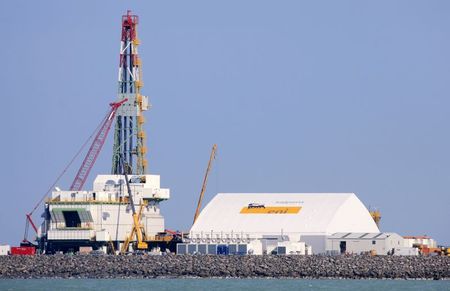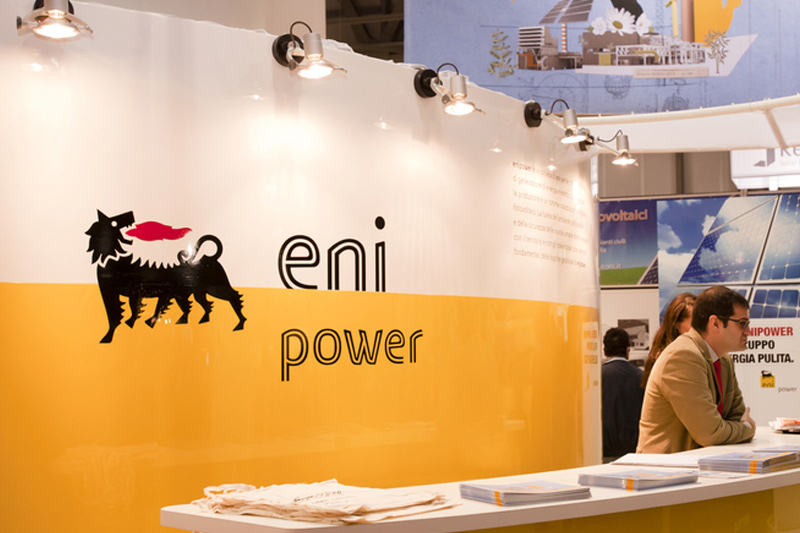By Stephen Jewkes
MILAN (Reuters) - Plans by Italian oil major Eni (MI:ENI) to slash its refining business by more than half could squeeze out a quarter of Europe's refining overcapacity, bringing the ailing sector badly needed relief.
European nameplate refining capacity is around 15 million barrels per day (bpd) but as demand falls and competition grows analysts say around 1.5-2.0 million bpd of throughput capacity needs to be mothballed by 2018 to balance the market.
Last week Claudio Descalzi, Eni's former head of exploration and production (E&P) who took over as chief executive in May, unveiled a plan to lop around 400,000 bpd of capacity from its refining business as it moves to staunch losses and focus on finding oil and gas.
Eni's sharpened focus on its lucrative E&P business was widely expected but the decision to halve its refining business, already fuelling a political backlash, caught some by surprise with its speed.
"The pace of action taken to refresh the organisational structure and close down underperforming refineries is Ferrari-esque," says Bernstein oil and gas analyst Oswald Clint.
Eni's refining and marketing unit, which analysts say accounts for 10 percent of capital employed, has been losing money for the last three years, with operating losses rising to 1.5 billion euros last year from 1.3 billion in 2012.
In July Fitch said failure by Eni to turn around its refining business over the next 12 to 18 months could trigger a downgrade of the Italian group's A+ rating.
By converting three of its six domestic plants to storage or bio-refineries and reducing its international exposure, Eni says it will be able to reach cash break even at the end of 2015.
Converting refineries to storage terminals would allow the company to save on very high decommissioning and cleaning costs that a full shutdown would require while retaining some jobs.
"It's more a move not to fire anyone. Negative refining margins means it makes more sense to keep on the workforce but not have them actually do anything," a Milan oil analyst said, referring to political sensitivities around laying off workers from a state-controlled company at a time of recession.
With sales unable to offset buying the crude oil and operating costs, many refineries are being converted to storage space since shutting them down is simply too expensive.
Eni's standard refining margin, that gauges the profitability of its refineries against typical raw material slate and yields, declined in the first half of 2014 by over 45 percent from a year earlier to $1.73 per barrel, effectively meaning it lost money on refining once taking operating costs into account.
The outlook for refining margins in Europe, especially the Mediterranean, remains bleak as overcapacity, weak fuel demand and increasing competition from imports from the United States, Russia and the Middle East take their toll.
The IEA estimates Europe has shut around 1.8 million bpd of capacity since 2008 - around 600,000 bpd in France, 400,000 bpd in France, 400,000 bpd in Britain, and 400,000 in Italy.
Bernstein's Clint estimates removal of 460,000 bpd by Eni would imply an uplift of $1.5-2.0 per barrel to Europe's cracking margin. "If you knock out a few hundred barrels per day of capacity from 1.5 million bpd of overcapacity you help Europe at the margin but we need more closures," he said.
Italy built a lot of its refining capacity in the boom of the 1950s and 1960s but failed to cut back sharply due to political concerns over job losses despite a decline in demand.
Eni, whose refining capacity in 2013 stood at 787,000 bpd, gave no details on the three plants it aims to restructure but trade unions told Reuters they were Taranto, Gela and Livorno, which together have a capacity of around 350,000 bpd.
The Gela refinery, where Eni has earmarked 2.2 billion euros of spending, will be transformed into a green bio-refinery, while other assets may be converted into storage facilities.
Eni's aggressive capacity cut could help change the fortunes of independent Italian rivals Saras (MI:SRS), partly controlled by Russia's Rosneft (MM:ROSN), and Api, analysts said.
HEADCOUNT
The state-controlled oil major has said it sees no headcount reduction in its plans which could help the chances of success by making talks with unions and authorities a bit easier. Job creation is a top priority of the government of Matteo Renzi.
But trade unions worry the restructuring could eventually lead to up to 6,000 job cuts and the permanent closure of some sites at a time when unemployment levels are at record highs.
"It's very worrying jobs-wise since there's a big difference between a refinery and storage. We will be meeting the company and the government before Sept. 15 to discuss things," said Sergio Gigli, secretary general of the Femca-Cisl union.
Gigli said at a time when Russia's Lukoil (MM:LKOH) was gearing up to invest 1 billion euros in its Sicilian refinery to boost growth, Eni was slimming down to a point where it might not have enough refining capacity to meet its own domestic retail needs and might have to buy oil products.
"The CEO told us Taranto will probably become a storage facility but was unclear on Livorno where they could be looking for a partner," Gigli said.
Besides its Italian refineries, Eni also has foreign assets. In May it announced the sale of its stake in Ceska Rafinerska and has said it could exit its 20 percent holding in the 262,000 bpd Bayernoil refinery and its 8 percent stake in Schwedt.

(Additional reporting by Ron Bousso in London, editing by David Evans)
